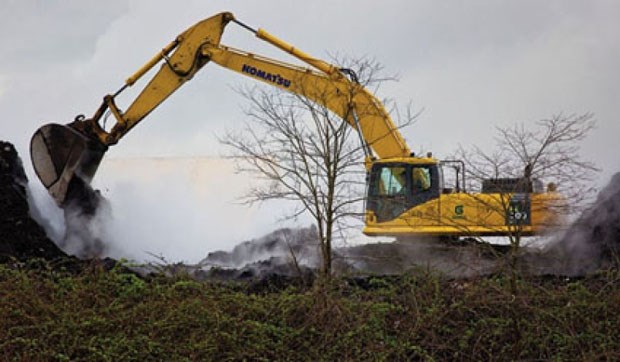Local residents are still waiting for a decision from the Environmental Appeal Board (EAB) regarding relief from the offensive odours connected to the GFL/Enviro-Smart East Ladner food waste recycling facility.
After 44 days at the EAB hearing which commenced last June and ended this July, the Resident Appellants provided their final submission to the EAB in late August. The original hearing was to last only 15 days, but continued in the fall of 2019 and spring of 2020 until the residents asked for it to be postponed because of the COVID-19 pandemic.
It is expected that the EAB will provide its findings sometime this month.
The grassroots community group, also known as Stop the Compost Stink on Facebook, were self-represented at the hearings.
Ladner residents in the neighbourhoods from Highway 17a to 72nd Street, north and south of Ladner Trunk Road have filed hundreds of complaints with Metro Vancouver since 2008 against the odour produced by the 72nd Street facility. Most complaints involved health issues, the negative impact on quality of life and their property values.
In August 2018, Metro Vancouver issued an Air Quality Permit (AQP) to GFL which was promptly appealed as being too restrictive. The residents appealed the permit for not protecting them or the environment from odourous air contaminants.
Spokesperson for the Resident Appellants, Peggy Richardson, said residents continued to file verifiable complaints throughout the EAB hearing.
“Metro Vancouver found it hard to keep up with the complaints,” said Richardson. “By the time their officers came to investigate, sometimes hours later, the wind would shift and the odour gone. We realize that Metro Vancouver must find a balance between the interests of a business and protecting the environment, but this permit does not go far enough for that protection. The 2015 Climate Action Charter requires diversion of food waste from the landfill. That plan did not take into account side effects of emissions and odour from a large scale composting site.
“We can all agree composting is a beneficial process. Unfortunately, GFL have been allowed to operate an industrial open-air facility on Agricultural Land Reserve farmland next to an urban area. The odours became worse and more frequent with GFL. We are tired of filing complaints with Metro Vancouver.”
GFL has been upgrading their facility to enclose the operations, which was to have been completed by March 2020. Because of the COVID-19 pandemic, GFL applied for and received an extension from the EAB.
Several emails from the Optimist to GFL for comment on the hearing as well as a status on construction of their new facility have gone unanswered.
“Their upgraded facility will be a first of its kind and is untested,” added Richardson. “There is no proof that it will work and therefore we appealed for stronger regulations until it is proven to eliminate odourous air contaminants. During the hearings, it became obvious GFL was dragging their feet in applying for the permit. They just didn’t want the air quality permit and testing requirements to control what they discharge into our environment.”



